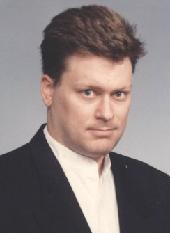College Crunch honors Robert Marks for Work on ID
Here’s an article that appeared today in my local paper. It will be interesting to see what the incoming Baylor president Kenneth Starr does about the Marks case when he arrives June 1st, especially in light of this recognition by College Crunch. For Prof. Marks to have his lab and research (see evoinfo.org) recognized and reinstated by Baylor as legitimately part of his job description would, perhaps, constitute a truer vindication of his work on evolutionary informatics. Even so, the College Crunch list, designating Marks as one of the “20 most brilliant Christian professors,” is a foretaste of good things to come.
————————————
 Baylor faculty member named one of ’20 Most Brilliant Christian Professors’
Baylor faculty member named one of ’20 Most Brilliant Christian Professors’
[alternative title in local paper: “In the Spotlight, Again: BU Professor Marks Nets Honor for Research in Evolutionary Informatics”]
[PHOTO CAPTION: Marks was named one of “The 20 Most Brilliant Christian Professors” by CollegeCrunch.org (link here).]
By Tim Woods Tribune-Herald staff writer
Thursday April 15, 2010
http://www.wacotrib.com/news/Baylor-faculty-member-named-one-of-20-Most-Brilliant-Christian-Professors.html
Robert Marks, Baylor University Distinguished Professor of electrical and computer engineering, once again finds himself in the spotlight.
Less than three years ago, Marks was at the center of an intelligent design-related controversy at the school.
But Marks now is being honored for his work, notably his research in the area of evolutionary informatics.
CollegeCrunch.org, a college resource Web site, named Marks as one of “the 20 most brilliant Christian professors.” Read More ›
 Professor Edward Feser is an intrepid philosopher, who is not afraid to confront error head-on and expose it for what it is. That is an admirable trait. He is also a former atheist, who now defends religion from a traditional Roman Catholic perspective. In his book The Last Superstition (St. Augustine’s Press, 2008; available
Professor Edward Feser is an intrepid philosopher, who is not afraid to confront error head-on and expose it for what it is. That is an admirable trait. He is also a former atheist, who now defends religion from a traditional Roman Catholic perspective. In his book The Last Superstition (St. Augustine’s Press, 2008; available 
 Many conceptual and experimental attempts have been made by evolutionists to explain the arise of the huge complexity and organization of nature based on unguided processes, that is without the intervention of an organizing intelligence. Among them I recall those related to chaos theory, evolutionary algorithms, emergent properties, far-from-equilibrium dynamical systems, self-organized criticality (SOC). Here I will briefly focus on SOC, the last on this list though not the recent one.
Many conceptual and experimental attempts have been made by evolutionists to explain the arise of the huge complexity and organization of nature based on unguided processes, that is without the intervention of an organizing intelligence. Among them I recall those related to chaos theory, evolutionary algorithms, emergent properties, far-from-equilibrium dynamical systems, self-organized criticality (SOC). Here I will briefly focus on SOC, the last on this list though not the recent one.